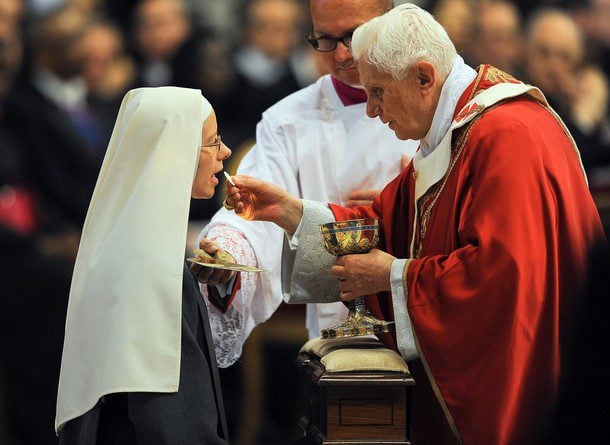…which should not exist, for we receive the liturgy, and do not create it, it is worth pointing out something we can all agree on: Liturgy itself is awesome. I did an amateur covering of this fact a while back, defending liturgy with three points.
1. That Everyone uses a liturgy.
2. That liturgy is essentially universal and wonderfully democratic.
3. That the Liturgy is a gift.
I’d like to think that those three post are decent ‘primer posts’ for discussion on the Liturgy, as I realize I may be leaving a lot of people out with the whole Just Say No to Your Traddy/Modern Labels! thing. For all of you who’ve already read those, read C.S. Lewis!

It looks as if they believed people can be lured to go to church by incessant brightenings, lightenings, lengthenings, abridgements, simplifications, and complications of the service. And it is probably true that a new, keen vicar will usually be able to form within his parish a minority who are in favour of his innovations. The majority, I believe, never are. Those who remain — many give up churchgoing altogether — merely endure.
Novelty, simply as such, can have only an entertainment value.And they don’t go to church to be entertained. They go to use the service, or, if you prefer, to enact it. Every service is a structure of acts and words through which we receive a sacrament, or repent, or supplicate, or adore. And it enables us to do these things best — if you like, it “works” best — when, through long familiarity, we don’t have to think about it. As long as you notice, and have to count, the steps, you are not yet dancing but only learning to dance. A good shoe is a shoe you don’t notice. Good reading becomes possible when you need not consciously think about eyes, or light, or print, or spelling. The perfect church service would be one we were almost unaware of; our attention would have been on God.
But every novelty prevents this. It fixes our attention on the service itself; and thinking about the worship is a different thing from worshipping. The important question about the Grail was “for what does it serve?” “‘Tis mad idolatry that makes the service greater than the god.”
A still worse thing may happen. Novelty may fix our attention not even on the service but on the celebrant. You know what I mean. Try as one may to exclude it, the questions “What on earth is he up to now?” will intrude. It lays one’s devotion waste. There is really some excuse for the man who said, “I wish they’d remember that the charge to Peter was Feed my sheep; not Try experiments on my rats, or even, Teach my performing dogs new tricks.”











